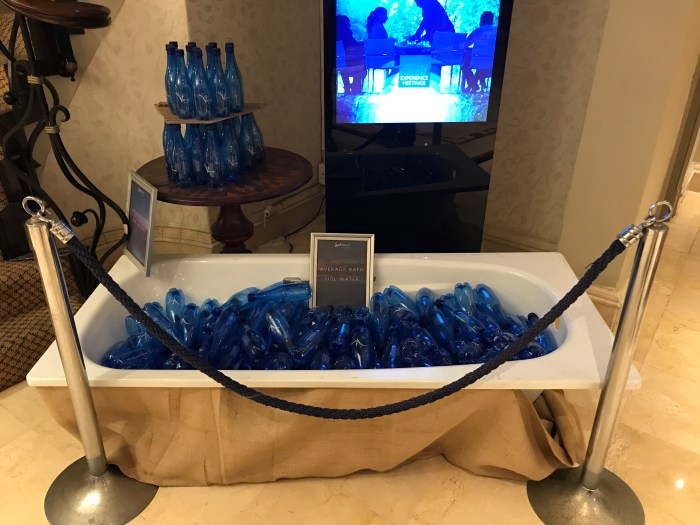I have written before about Day Zero in Cape Town. Day Zero was the day when all the taps would be turned off and people would queue at collection points for 25 litres of water a day.
Luckily it has rained since then so the situation is not as dire, but everywhere you go in Cape Town (and most other areas of South Africa) you are reminded that there is a severe drought.
When we arrived at Cape Town airport,the entire airport was filled with signs, posters and pillars, reminding people in different ways that every drop counts. There were visual depictions of how you can save water and how much water different activities take. The taps in the airport toilets were all turned off and the water replaced with disinfectant gel. At most of the hotels where we stayed, the swimming pools were empty and the baths were not allowed to be used. They also encouraged people to think of the drought when requesting new towels and bedlinen. There were posters and billboards everywhere.
As we moved around the city and country there taps were turned off in public bathrooms, and when one person on the top of Table Mountain used the ’emergency’ tap to wash her hands, several people told her why it was important not to use water. People mostly seem to realise that pulling together is the only way to go.
I grew up with water shortages so it is more or less ingrained in me to use as little water as possible. I never let the tap run when I brush my teeth and always do the wet-soap-rinse when I shower, never letting the water just run.
What surprised me though is how quickly other people from water-rich countries get used to thinking about conserving water. It soon becomes second nature not to flush unless necessary and consider whether you REALLY need to shower that day.
At my cousin’s house we showered standing in a large bucket and then used that water to flush the toilet. My cousin also has a spray that takes the smell out of urine so you don’t have to flush as often.















Farmers from the Hex River Valley saw the drought coming in April 2015, as they can read the signs in nature. The “paid experts” never saw it coming. The Premier asked Central Govt for funding by November 2015 yet nobody would believe that disaster was looming as said Premier never implemented water restrictions. Our current Mayor was in denial and in the 1st quarter of 2017, said “there is no dire problem.”
We as a community stood together and here I include tourists, as there was great co-operation. Some locals warned off tourists, that was the only real damage we suffered.
One must use water sparingly, I also grew up in an arid region. Then,one must trust God for provision while doing your own bit to help.
I never bought bottled water and only once had a bad taste in a glass of water. I know what the dams look like, one can safely drink without purification, even. I don’t trust expensive bottled water as some is just recycled industrial waste, or otherwise tap water anyhow. Much of it is a rip-off.